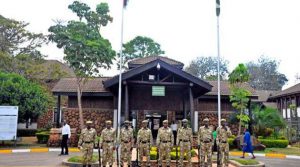
Kenya Wildlife Service (KWS) organization has paid Sh48 million to the families of victims killed by wildlife in the last two financial years, Makueni Warden Ms Constance Mwasho has said.
Mwasho disclosed that in the 2018/2019 fiscal year, families of six people killed by wild animals were each paid Sh5 million while 12 others have been paid Sh1.5 million each in the 2019/2020 financial year.
She said this on Wednesday at Nzambani market in Kibwezi East sub-county during a sensitization baraza called to educate the local residents on the need to resolve the human/wildlife conflict in the area.
“A person killed by a wild animal is paid Sh5 million as compensation but those killed by poisonous snakes are not compensated according to the KWS Act. The 12 cases will be paid in four phases,” the county warden said.
However, Mwasho said that compensation claims for destruction of property especially tanks in schools and homesteads and crops were pending.
While saying the amounts awarded as compensation to injured persons varied depending on the injuries, Mwasho however did not give the total cases of deaths and injuries during the period.
Speaking at the same event, the Ivingoni Nzambani Ward Member of County Assembly (MCA) Alfred Mutie called on KWS to ensure they gave back to the community by constructing earth pans in the communities living next to the national parks.
Mutie who is also the Deputy Speaker of Makueni County Assembly said that this will improve the relations of KWS rangers and the people hence ensure the sensitisation is done continuously.
“The Corporate Social Responsibility should extend to the people living in Chyulu and Tsavo West National Parks like it used to be. This will enhance good relations that will lead to peaceful co-existence and ensure the conservation of the animals,” he said.
In the recent past, marauding elephants have moved out of Tsavo West and Chyulu National parks and killed as well as injured people and destroyed tanks in schools and homesteads and at times disrupted learning in schools.
On his part, Kibwezi East Sub-County Deputy County Commissioner Mr. Joseph Orambui Nyakwara said the growth in population was leading people to encroach on national parks a situation that he said needs to be stopped.
Nyakwara called on the stakeholders to come up with a lasting solution saying it was a collective responsibility.
“There is a need for KWS, security agencies, leaders and residents to come up with a lasting solution that will end the human-wildlife conflict in this area,” said Nyakwara.
The sensitisation programmes have been organized by the National Drought Management Authority and will be carried out in Kibwezi, Makindu and Mukaa Sub-counties where human/wildlife conflict cases are rampant.